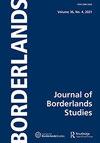Borderlands of Governance – Multilevel Cross-border Governance and Trajectories of Local Cross-border Ties in the Franco-German Moselle-Saarland Region
IF 1.4
Q2 GEOGRAPHY
引用次数: 0
Abstract
ABSTRACTIn recent years, cross-border cooperation within the European Union – in particular between France and Germany – has experienced renewed “top-down” and “bottom-up” impulses towards a new multiscalarity. Focussing on the Moselle-Saarland region, we outline the relevance of local cross-border networks – conceptualized as “borderlands of governance” – for border-regional cooperation, which became particularly evident throughout the management of the Covid-19-pandemic. Making use of windows of opportunity offered by traditional “top-down” governance, borderlands of governance offer and perpetuate notions of alternative (cross-border) spatialities as relevant spaces of political action, both through practical spearheading of cross-border projects and through the representation of border interests within structures of multilevel governance.KEYWORDS: Multilevel cross-border governanceborderlands of governancegreater regionregional cross-border strategiesintermunicipal cooperationAachen treaty Disclosure StatementNo potential conflict of interest was reported by the author(s).Notes1 In 2016, the French territorial reform merged the three former régions into one larger région Grand Est. The départements of the former région Lorraine have been pursuing a devolution of border-relevant competencies – while the département Alsace has been granted competencies pertaining to language education, tourism, and marketing under the label of a “Collectivitée Européenne d‘Alsace”, the département Moselle has been pursuing a similar devolution of competencies under the label of a “Eurodépartement Moselle” (Département de la Moselle Citation2019).2 “Angepasste Rechts- und Verwaltungsvorschriften einschließlich Ausnahmeregelungen”3 Our research interest lies specifically with the experiences and bottom-up perspectives of mayors as local, on the ground decisions-makers. The French intermunicipal associations (EPCI) exert competencies relevant to cross-border governance (such as economic development), but directly represent the interests of their constituent municipalities rather than constituting a distinct political-administrative level within territorial governance structures. They were therefore not included in our qualitative or quantitative research.4 Our empirical focus lies on French and German municipalities, however, interviews with mayors from Luxembourg allowed to explore similarities or differences between the three “core members” (“SaarLorLux”) of the Greater Region.5 Of the municipalities taking part in the survey, 14 were border municipalities, and 29 non-border municipalities. The remaining seven municipalities could not be identified and were not included in comparative analyses distinguishing between border and non-border municipalities.6 To ensure readability, all interview quotes were translated into English.Additional informationFundingThis work was supported by Staatskanzlei des Saarlandes.治理的边疆——法德摩泽尔-萨尔地区多层次跨境治理与地方跨境关系轨迹
近年来,欧盟内部的跨境合作,特别是法国和德国之间的合作,经历了新的“自上而下”和“自下而上”的冲动,走向新的多尺度。以摩泽尔-萨尔地区为重点,我们概述了当地跨境网络(概念为“治理的边境地区”)与边境区域合作的相关性,这在整个covid -19大流行的管理过程中尤为明显。利用传统的“自上而下”治理提供的机会之窗,治理的边界地区通过跨境项目的实际先锋和多层次治理结构中的边界利益代表,提供并延续了替代(跨境)空间性的概念,作为政治行动的相关空间。关键词:多层次跨境治理;治理疆域;大区域区域跨境战略;城市间合作;亚琛条约披露声明;注1 2016年,法国领土改革将三个前区域合并为一个更大的大东部区域。前洛林区域的区域一直在追求边界相关能力的下放,而阿尔萨斯区域的区域则被授予语言教育、旅游和营销方面的能力,并被称为“阿尔萨斯欧洲区域”。摩泽尔组织一直在“欧洲摩泽尔组织”的标签下寻求类似的权力下放(摩泽尔组织引用2019)我们的研究兴趣主要集中在作为当地决策者的市长的经验和自下而上的观点。法国城市间协会(EPCI)发挥与跨境治理(如经济发展)相关的能力,但直接代表其组成城市的利益,而不是在领土治理结构中构成一个独特的政治-行政层面。因此,它们没有包括在我们的定性或定量研究中我们的实证重点是法国和德国的市政当局,然而,与卢森堡市长的访谈允许探索大区三个“核心成员”(“SaarLorLux”)之间的异同。5参与调查的市政当局中,14个是边境市政当局,29个是非边境市政当局。其余7个城市无法确定,也没有列入区分边界和非边界城市的比较分析为了确保可读性,所有采访引用都被翻译成英文。本研究得到了萨尔州州政府的支持。
本文章由计算机程序翻译,如有差异,请以英文原文为准。
求助全文
约1分钟内获得全文
求助全文

 求助内容:
求助内容: 应助结果提醒方式:
应助结果提醒方式:


